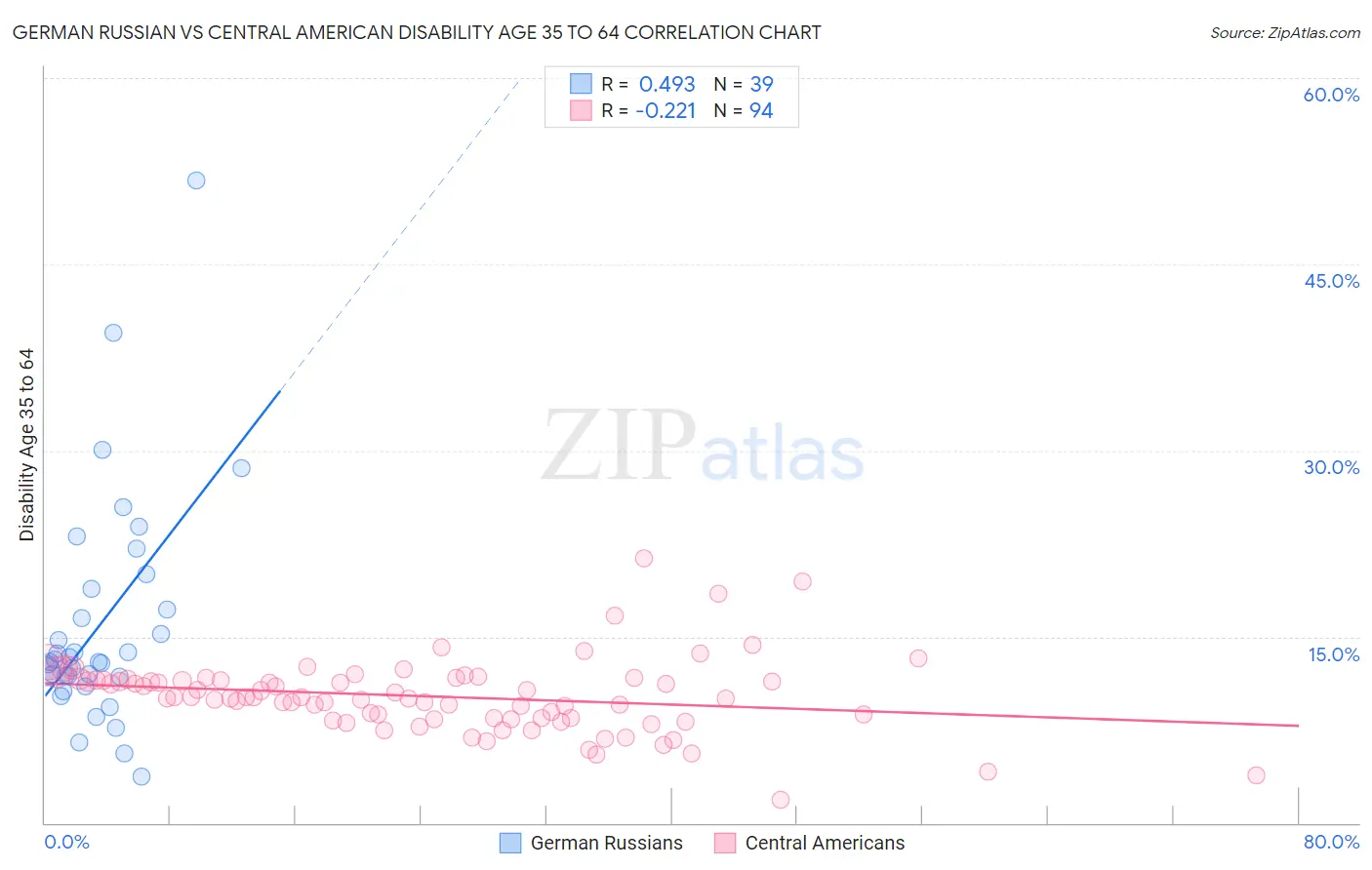German Russian vs Central American Disability Age 35 to 64
COMPARE
German Russian
Central American
Disability Age 35 to 64
Disability Age 35 to 64 Comparison
German Russians
Central Americans
12.5%
DISABILITY AGE 35 TO 64
0.5/ 100
METRIC RATING
260th/ 347
METRIC RANK
11.2%
DISABILITY AGE 35 TO 64
59.1/ 100
METRIC RATING
168th/ 347
METRIC RANK
German Russian vs Central American Disability Age 35 to 64 Correlation Chart
The statistical analysis conducted on geographies consisting of 96,440,247 people shows a moderate positive correlation between the proportion of German Russians and percentage of population with a disability between the ages 34 and 64 in the United States with a correlation coefficient (R) of 0.493 and weighted average of 12.5%. Similarly, the statistical analysis conducted on geographies consisting of 503,944,688 people shows a weak negative correlation between the proportion of Central Americans and percentage of population with a disability between the ages 34 and 64 in the United States with a correlation coefficient (R) of -0.221 and weighted average of 11.2%, a difference of 11.4%.

Disability Age 35 to 64 Correlation Summary
| Measurement | German Russian | Central American |
| Minimum | 3.7% | 1.8% |
| Maximum | 51.7% | 21.3% |
| Range | 48.0% | 19.5% |
| Mean | 16.0% | 10.2% |
| Median | 13.0% | 10.1% |
| Interquartile 25% (IQ1) | 11.8% | 8.4% |
| Interquartile 75% (IQ3) | 18.8% | 11.5% |
| Interquartile Range (IQR) | 7.1% | 3.1% |
| Standard Deviation (Sample) | 9.2% | 3.0% |
| Standard Deviation (Population) | 9.1% | 3.0% |
Similar Demographics by Disability Age 35 to 64
Demographics Similar to German Russians by Disability Age 35 to 64
In terms of disability age 35 to 64, the demographic groups most similar to German Russians are Malaysian (12.5%, a difference of 0.15%), Senegalese (12.5%, a difference of 0.23%), English (12.4%, a difference of 0.25%), Welsh (12.4%, a difference of 0.37%), and Mexican (12.4%, a difference of 0.46%).
| Demographics | Rating | Rank | Disability Age 35 to 64 |
| Dutch | 1.0 /100 | #253 | Tragic 12.3% |
| Hawaiians | 0.9 /100 | #254 | Tragic 12.3% |
| Japanese | 0.8 /100 | #255 | Tragic 12.3% |
| Scottish | 0.8 /100 | #256 | Tragic 12.4% |
| Mexicans | 0.7 /100 | #257 | Tragic 12.4% |
| Welsh | 0.6 /100 | #258 | Tragic 12.4% |
| English | 0.6 /100 | #259 | Tragic 12.4% |
| German Russians | 0.5 /100 | #260 | Tragic 12.5% |
| Malaysians | 0.5 /100 | #261 | Tragic 12.5% |
| Senegalese | 0.5 /100 | #262 | Tragic 12.5% |
| Immigrants | Zaire | 0.4 /100 | #263 | Tragic 12.5% |
| Immigrants | Portugal | 0.4 /100 | #264 | Tragic 12.5% |
| Marshallese | 0.4 /100 | #265 | Tragic 12.5% |
| Whites/Caucasians | 0.3 /100 | #266 | Tragic 12.6% |
| Sub-Saharan Africans | 0.2 /100 | #267 | Tragic 12.6% |
Demographics Similar to Central Americans by Disability Age 35 to 64
In terms of disability age 35 to 64, the demographic groups most similar to Central Americans are Haitian (11.2%, a difference of 0.010%), Immigrants from Uganda (11.2%, a difference of 0.090%), Immigrants from Trinidad and Tobago (11.2%, a difference of 0.26%), Italian (11.2%, a difference of 0.29%), and Austrian (11.1%, a difference of 0.35%).
| Demographics | Rating | Rank | Disability Age 35 to 64 |
| Immigrants | Guyana | 70.1 /100 | #161 | Good 11.1% |
| Immigrants | Grenada | 68.4 /100 | #162 | Good 11.1% |
| Immigrants | St. Vincent and the Grenadines | 66.6 /100 | #163 | Good 11.1% |
| Pakistanis | 65.8 /100 | #164 | Good 11.1% |
| Immigrants | Western Europe | 65.2 /100 | #165 | Good 11.1% |
| Immigrants | Haiti | 63.8 /100 | #166 | Good 11.1% |
| Austrians | 63.2 /100 | #167 | Good 11.1% |
| Central Americans | 59.1 /100 | #168 | Average 11.2% |
| Haitians | 59.0 /100 | #169 | Average 11.2% |
| Immigrants | Uganda | 58.0 /100 | #170 | Average 11.2% |
| Immigrants | Trinidad and Tobago | 55.9 /100 | #171 | Average 11.2% |
| Italians | 55.6 /100 | #172 | Average 11.2% |
| Lebanese | 51.8 /100 | #173 | Average 11.3% |
| Immigrants | Fiji | 50.0 /100 | #174 | Average 11.3% |
| Czechs | 47.9 /100 | #175 | Average 11.3% |